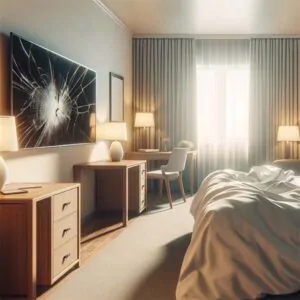Rising Challenge in Hotels: Tackling the Surge of Broken TVs - Innovative Solutions and Strategies
Table of Contents
ToggleIn recent times, the hotel industry has witnessed a significant increase in the number of broken televisions, particularly those with punched-in screens. This trend, once a rarity, has now become a frequent occurrence, posing new challenges for hotel management.
The Fin ancial Impact on Properties
ancial Impact on Properties
The surge in broken TVs has a substantial financial impact on properties. Replacing these televisions is costly, and often the incidental deposits collected from guests fall short of covering these expenses. This situation leaves hotels in a dilemma, especially when trying to balance guest satisfaction with financial sustainability.
Challenges in Budget-Friendly Hotel Sectors
Budget-friendly hotels face a unique challenge. While luxury hotels can impose higher deposits to cover potential damages, budget hotels cannot afford to alienate their price-sensitive clientele with steep deposits. This limitation restricts their ability to fully safeguard against damages.
Strategies for Mitigating Damages
To combat this issue, hotels have adopted various strategies. One such method is the installation of screen protectors on TVs. Although not entirely foolproof, they provide a layer of protection. Additionally, ID scanning at check-in has proven effective in deterring guests from causing damage, as it holds them more accountable.
The Role of Deposits in Damage Control

Deposits play a crucial role in mitigating the financial burden of damages. Some hotels insist on a mandatory deposit, which is not refunded until the room is inspected for damages. While this doesn’t always cover the full cost of a broken TV, it acts as a deterrent and a financial cushion.
Comparing Practices in Budget vs. Luxury Hotels
The disparity in practices between budget and luxury hotels is evident in their approach to handling damages. Luxury hotels can demand higher deposits, sometimes exceeding $500, while budget hotels have to tread more cautiously to avoid deterring guests.
The Psychology Behind Guest Damages
Understanding the psychology behind why guests damage property is crucial. Factors such as impulsivity, disregard for property due to anonymity, or even alcohol-induced behavior play a role. Addressing these underlying issues is key to reducing incidents.
Legal and Ethical Considerations
Hotels must navigate the legal and ethical aspects of charging guests for damages. Transparency in policies and ensuring guests are aware of the consequences of damaging property are essential to avoid legal disputes and maintain ethical standards.
Future Trends in Hotel Damage Management
The future of damage management in hotels may see more reliance on technology, such as advanced monitoring systems and AI-driven guest profiling, to predict and prevent damages.
The Impact of Technology on Preventing Damages
Technology plays a pivotal role in damage prevention. From advanced surveillance to smart TVs that can detect tampering, the integration of technology is a game-changer in mitigating risks.
Guest Education and Awareness Programs
Educating guests about the consequences of their actions and the costs associated with damages can foster a sense of responsibility and reduce incidents of vandalism.
The Role of Insurance in Damage Coverage
Insurance can be a vital tool for hotels to cover the costs of damages. Understanding the right insurance policies and how they can mitigate financial losses is crucial for hotel management.
Balancing Guest Satisfaction and Damage Prevention
Finding the right balance between ensuring guest satisfaction and preventing damage is a delicate task. Hotels must create an environment that is welcoming yet firm in its policies regarding property care.
Conclusion: Finding a Sustainable Solution
In conclusion, the surge in broken TVs in hotels is a multifaceted issue requiring a balanced approach. Combining technology, effective policies, guest education, and a deep understanding of guest behavior can lead to sustainable solutions.

 ancial Impact on Properties
ancial Impact on Properties